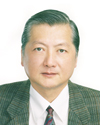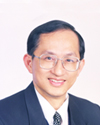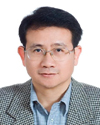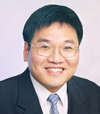|
The American headquarters of IEEE (Institute of Electrical and Electronic Engineers) finished the review and evaluation of its 2010 fellows in November of 2009. The College of Electrical Engineering and Computer Science of NTU has five professors elected to IEEE fellowship. They are: Professor Po-Wen Hsu, Professor Ching-Fuh Lin, Professor Shen-Iuan Liu, Professor Wang-Jiun Liao, and Professor Ruey-Beei Wu. This year marks the first time that the College of Electrical Engineering and Computer Science has the largest number of faculty members elected to IEEE fellowship. According to a spokesman from the College, this year Taiwan has 12 IEEE fellows, and the College of Electrical Engineering and Computer Science alone has five. And the number of IEEE fellows in the College has amounted to 29, topping all universities in Taiwan.
 Professor Po-Wen Hsu teaches at the Department of Electrical Engineering, the Institute of Communication Engineering, and the Institute of Photonics and Opto-Electronics. Over the years he has dedicated himself to the research of slot antennas, and his precise analysis of the rectangular waveguide tube narrow chute in the early years significantly reduced the time needed to design the large scale radar array antenna. In recent years his innovative research on the planar slot antenna including broadband, multi-frequency, ultra-broadband and miniaturization, etc., provided key reference to the design of wireless hand-held antennas. In addition, Professor Hsu was the founding and the first Dean of the College, his outstanding leadership capability in the Electrical Engineering education has been recognized internationally. It is truly a deserved honor for him that he was awarded IEEE fellowship. Professor Po-Wen Hsu teaches at the Department of Electrical Engineering, the Institute of Communication Engineering, and the Institute of Photonics and Opto-Electronics. Over the years he has dedicated himself to the research of slot antennas, and his precise analysis of the rectangular waveguide tube narrow chute in the early years significantly reduced the time needed to design the large scale radar array antenna. In recent years his innovative research on the planar slot antenna including broadband, multi-frequency, ultra-broadband and miniaturization, etc., provided key reference to the design of wireless hand-held antennas. In addition, Professor Hsu was the founding and the first Dean of the College, his outstanding leadership capability in the Electrical Engineering education has been recognized internationally. It is truly a deserved honor for him that he was awarded IEEE fellowship.
 Professor Ruey-Beei Wu teaches at the Department of Electrical Engineering and the Institute of Communication Engineering. He is conversant in numerical electromagnetics, microwave technology, and electronic packaging, etc. His outstanding achievements in research won him the National Science Council's Outstanding Research Award four times. This year he was awarded IEEE fellowship owing to his contribution to the passive components of coplanar waveguide(CPW). CPW was first proposed by a Chinese scholar by the name of C. P. Wen in 1969, and the teams at the Department of Electrical Engineering at NTU conducted a series of related research from 1990. Based on electro-magnetic theory, Professor Wu established a complete analytic model, which could convert the CPW structure into an equivalent circuit, thereby conducting effective design. Later on the model was used to develop many passive components, including the silicon millimeter wave 30 GHz filter in the early days, the THz filter and antenna design in recent years, and the THz transmitter which he co-developed with his colleague at the Department and which made the cover of a journal. In addition to his research, his service at IEEE also received wide acclaim. Because of his outstanding leadership as Chairman of IEEE Taiwan, he received The Region 10 Outstanding Volunteer Award this year, and the Taipei Chapter of IEEE also received the MGA outstanding Large Section Award. The Taipei Chapter is the only branch office in the world that received such an honor, and this marks the first time in 35 years since its founding that the Chapter wins this award. Professor Ruey-Beei Wu teaches at the Department of Electrical Engineering and the Institute of Communication Engineering. He is conversant in numerical electromagnetics, microwave technology, and electronic packaging, etc. His outstanding achievements in research won him the National Science Council's Outstanding Research Award four times. This year he was awarded IEEE fellowship owing to his contribution to the passive components of coplanar waveguide(CPW). CPW was first proposed by a Chinese scholar by the name of C. P. Wen in 1969, and the teams at the Department of Electrical Engineering at NTU conducted a series of related research from 1990. Based on electro-magnetic theory, Professor Wu established a complete analytic model, which could convert the CPW structure into an equivalent circuit, thereby conducting effective design. Later on the model was used to develop many passive components, including the silicon millimeter wave 30 GHz filter in the early days, the THz filter and antenna design in recent years, and the THz transmitter which he co-developed with his colleague at the Department and which made the cover of a journal. In addition to his research, his service at IEEE also received wide acclaim. Because of his outstanding leadership as Chairman of IEEE Taiwan, he received The Region 10 Outstanding Volunteer Award this year, and the Taipei Chapter of IEEE also received the MGA outstanding Large Section Award. The Taipei Chapter is the only branch office in the world that received such an honor, and this marks the first time in 35 years since its founding that the Chapter wins this award.
 Professor Ching-Fuh Lin teaches at the Institute of Photonics and Opto-electronics, the Institute of Electronic Engineering and the Department of Electrical Engineering. He has made outstanding contributions to the innovation of opto-electronics. And for his innovative research in the extreme broadband semi-conductor opto-electrical components he received recognition from IEEE. He and the research team under his leadership achieved many technological breakthroughs in broadband semiconductor optical amplifiers, large scope tunable semiconductor lasers, silicon semiconductor light-emitting components, and organic and inorganic hybrid thin-film solar cells. The record-breaking broadband semiconductor optical amplifier attracted the attention of a famous instrument company—The Agilent Technologies, which sought to engage in cooperation projects with his laboratory. And his team was able to develop for the first time a silicon semiconductor component that could emit light similar to laser, which was reported in the newsbreaks of MRS Bulletin News and Laser Focus World. Professor Lin is currently an academician of SPIE and Asia Pacific Academy of Science Materials. Professor Ching-Fuh Lin teaches at the Institute of Photonics and Opto-electronics, the Institute of Electronic Engineering and the Department of Electrical Engineering. He has made outstanding contributions to the innovation of opto-electronics. And for his innovative research in the extreme broadband semi-conductor opto-electrical components he received recognition from IEEE. He and the research team under his leadership achieved many technological breakthroughs in broadband semiconductor optical amplifiers, large scope tunable semiconductor lasers, silicon semiconductor light-emitting components, and organic and inorganic hybrid thin-film solar cells. The record-breaking broadband semiconductor optical amplifier attracted the attention of a famous instrument company—The Agilent Technologies, which sought to engage in cooperation projects with his laboratory. And his team was able to develop for the first time a silicon semiconductor component that could emit light similar to laser, which was reported in the newsbreaks of MRS Bulletin News and Laser Focus World. Professor Lin is currently an academician of SPIE and Asia Pacific Academy of Science Materials.
 Professor Shen-Iuan Liu teaches at the Department of Electrical Engineering and the Institute of Electronic Engineering. For his outstanding contributions to the integrated circuit design in phased locked loop and delayed locked loop over many years, he was awarded IEEE fellow. The team under his leadership achieved many breakthroughs in the techniques of phased locked loop and delayed locked loop , such as 96 GHz CMOS phased locked loop, 140 GHz CMOS divider and 40GHz CMOS delayed locked loop, all occupying a leading position internationally. Professor Shen-Iuan Liu teaches at the Department of Electrical Engineering and the Institute of Electronic Engineering. For his outstanding contributions to the integrated circuit design in phased locked loop and delayed locked loop over many years, he was awarded IEEE fellow. The team under his leadership achieved many breakthroughs in the techniques of phased locked loop and delayed locked loop , such as 96 GHz CMOS phased locked loop, 140 GHz CMOS divider and 40GHz CMOS delayed locked loop, all occupying a leading position internationally.
 Professor Wang-Jiun Liao teaches at the Department of Electrical Engineering, the Institute of Communication Engineering, and the Institute of Networking and Multimedia. She makes outstanding contributions to the innovation of wireless and multi-media networking techniques, and for many years her innovative research in the broadband and multi-media protocol received recognition from IEEE. The team under her leadership achieved many breakthroughs that received the best paper award in international conferences, and were indexed by many international organizations (including ITU-T, ETSI TIPHON, and IEEE 802.16m), in addition to being reported and cited by international journals and media. (including EE Times, IEEE Wireless Communications and IEEE Internet Computing) Professor Wang-Jiun Liao teaches at the Department of Electrical Engineering, the Institute of Communication Engineering, and the Institute of Networking and Multimedia. She makes outstanding contributions to the innovation of wireless and multi-media networking techniques, and for many years her innovative research in the broadband and multi-media protocol received recognition from IEEE. The team under her leadership achieved many breakthroughs that received the best paper award in international conferences, and were indexed by many international organizations (including ITU-T, ETSI TIPHON, and IEEE 802.16m), in addition to being reported and cited by international journals and media. (including EE Times, IEEE Wireless Communications and IEEE Internet Computing)
IEEE selects its new fellows once every year. Every time the number of new fellows can not exceed one thousandth of its total membership, therefore the selection process is extremely rigorous. Since the number of awardees are few, the competition among the famous universities in the world is quite severe National Taiwan University's College of Electrical Engineering and Computer Science has faculty members elected to IEEE fellowship over the last eleven years. Compared with the best universities in the world, NTU seems to be standing on an equal footing.
|


 Professor Po-Wen Hsu teaches at the Department of Electrical Engineering, the Institute of Communication Engineering, and the Institute of Photonics and Opto-Electronics. Over the years he has dedicated himself to the research of slot antennas, and his precise analysis of the rectangular waveguide tube narrow chute in the early years significantly reduced the time needed to design the large scale radar array antenna. In recent years his innovative research on the planar slot antenna including broadband, multi-frequency, ultra-broadband and miniaturization, etc., provided key reference to the design of wireless hand-held antennas. In addition, Professor Hsu was the founding and the first Dean of the College, his outstanding leadership capability in the Electrical Engineering education has been recognized internationally. It is truly a deserved honor for him that he was awarded IEEE fellowship.
Professor Po-Wen Hsu teaches at the Department of Electrical Engineering, the Institute of Communication Engineering, and the Institute of Photonics and Opto-Electronics. Over the years he has dedicated himself to the research of slot antennas, and his precise analysis of the rectangular waveguide tube narrow chute in the early years significantly reduced the time needed to design the large scale radar array antenna. In recent years his innovative research on the planar slot antenna including broadband, multi-frequency, ultra-broadband and miniaturization, etc., provided key reference to the design of wireless hand-held antennas. In addition, Professor Hsu was the founding and the first Dean of the College, his outstanding leadership capability in the Electrical Engineering education has been recognized internationally. It is truly a deserved honor for him that he was awarded IEEE fellowship.  Professor Ruey-Beei Wu teaches at the Department of Electrical Engineering and the Institute of Communication Engineering. He is conversant in numerical electromagnetics, microwave technology, and electronic packaging, etc. His outstanding achievements in research won him the National Science Council's Outstanding Research Award four times. This year he was awarded IEEE fellowship owing to his contribution to the passive components of coplanar waveguide(CPW). CPW was first proposed by a Chinese scholar by the name of C. P. Wen in 1969, and the teams at the Department of Electrical Engineering at NTU conducted a series of related research from 1990. Based on electro-magnetic theory, Professor Wu established a complete analytic model, which could convert the CPW structure into an equivalent circuit, thereby conducting effective design. Later on the model was used to develop many passive components, including the silicon millimeter wave 30 GHz filter in the early days, the THz filter and antenna design in recent years, and the THz transmitter which he co-developed with his colleague at the Department and which made the cover of a journal. In addition to his research, his service at IEEE also received wide acclaim. Because of his outstanding leadership as Chairman of IEEE Taiwan, he received The Region 10 Outstanding Volunteer Award this year, and the Taipei Chapter of IEEE also received the MGA outstanding Large Section Award. The Taipei Chapter is the only branch office in the world that received such an honor, and this marks the first time in 35 years since its founding that the Chapter wins this award.
Professor Ruey-Beei Wu teaches at the Department of Electrical Engineering and the Institute of Communication Engineering. He is conversant in numerical electromagnetics, microwave technology, and electronic packaging, etc. His outstanding achievements in research won him the National Science Council's Outstanding Research Award four times. This year he was awarded IEEE fellowship owing to his contribution to the passive components of coplanar waveguide(CPW). CPW was first proposed by a Chinese scholar by the name of C. P. Wen in 1969, and the teams at the Department of Electrical Engineering at NTU conducted a series of related research from 1990. Based on electro-magnetic theory, Professor Wu established a complete analytic model, which could convert the CPW structure into an equivalent circuit, thereby conducting effective design. Later on the model was used to develop many passive components, including the silicon millimeter wave 30 GHz filter in the early days, the THz filter and antenna design in recent years, and the THz transmitter which he co-developed with his colleague at the Department and which made the cover of a journal. In addition to his research, his service at IEEE also received wide acclaim. Because of his outstanding leadership as Chairman of IEEE Taiwan, he received The Region 10 Outstanding Volunteer Award this year, and the Taipei Chapter of IEEE also received the MGA outstanding Large Section Award. The Taipei Chapter is the only branch office in the world that received such an honor, and this marks the first time in 35 years since its founding that the Chapter wins this award.  Professor Ching-Fuh Lin teaches at the Institute of Photonics and Opto-electronics, the Institute of Electronic Engineering and the Department of Electrical Engineering. He has made outstanding contributions to the innovation of opto-electronics. And for his innovative research in the extreme broadband semi-conductor opto-electrical components he received recognition from IEEE. He and the research team under his leadership achieved many technological breakthroughs in broadband semiconductor optical amplifiers, large scope tunable semiconductor lasers, silicon semiconductor light-emitting components, and organic and inorganic hybrid thin-film solar cells. The record-breaking broadband semiconductor optical amplifier attracted the attention of a famous instrument company—The Agilent Technologies, which sought to engage in cooperation projects with his laboratory. And his team was able to develop for the first time a silicon semiconductor component that could emit light similar to laser, which was reported in the newsbreaks of MRS Bulletin News and Laser Focus World. Professor Lin is currently an academician of SPIE and Asia Pacific Academy of Science Materials.
Professor Ching-Fuh Lin teaches at the Institute of Photonics and Opto-electronics, the Institute of Electronic Engineering and the Department of Electrical Engineering. He has made outstanding contributions to the innovation of opto-electronics. And for his innovative research in the extreme broadband semi-conductor opto-electrical components he received recognition from IEEE. He and the research team under his leadership achieved many technological breakthroughs in broadband semiconductor optical amplifiers, large scope tunable semiconductor lasers, silicon semiconductor light-emitting components, and organic and inorganic hybrid thin-film solar cells. The record-breaking broadband semiconductor optical amplifier attracted the attention of a famous instrument company—The Agilent Technologies, which sought to engage in cooperation projects with his laboratory. And his team was able to develop for the first time a silicon semiconductor component that could emit light similar to laser, which was reported in the newsbreaks of MRS Bulletin News and Laser Focus World. Professor Lin is currently an academician of SPIE and Asia Pacific Academy of Science Materials.  Professor Shen-Iuan Liu teaches at the Department of Electrical Engineering and the Institute of Electronic Engineering. For his outstanding contributions to the integrated circuit design in phased locked loop and delayed locked loop over many years, he was awarded IEEE fellow. The team under his leadership achieved many breakthroughs in the techniques of phased locked loop and delayed locked loop , such as 96 GHz CMOS phased locked loop, 140 GHz CMOS divider and 40GHz CMOS delayed locked loop, all occupying a leading position internationally.
Professor Shen-Iuan Liu teaches at the Department of Electrical Engineering and the Institute of Electronic Engineering. For his outstanding contributions to the integrated circuit design in phased locked loop and delayed locked loop over many years, he was awarded IEEE fellow. The team under his leadership achieved many breakthroughs in the techniques of phased locked loop and delayed locked loop , such as 96 GHz CMOS phased locked loop, 140 GHz CMOS divider and 40GHz CMOS delayed locked loop, all occupying a leading position internationally.  Professor Wang-Jiun Liao teaches at the Department of Electrical Engineering, the Institute of Communication Engineering, and the Institute of Networking and Multimedia. She makes outstanding contributions to the innovation of wireless and multi-media networking techniques, and for many years her innovative research in the broadband and multi-media protocol received recognition from IEEE. The team under her leadership achieved many breakthroughs that received the best paper award in international conferences, and were indexed by many international organizations (including ITU-T, ETSI TIPHON, and IEEE 802.16m), in addition to being reported and cited by international journals and media. (including EE Times, IEEE Wireless Communications and IEEE Internet Computing)
Professor Wang-Jiun Liao teaches at the Department of Electrical Engineering, the Institute of Communication Engineering, and the Institute of Networking and Multimedia. She makes outstanding contributions to the innovation of wireless and multi-media networking techniques, and for many years her innovative research in the broadband and multi-media protocol received recognition from IEEE. The team under her leadership achieved many breakthroughs that received the best paper award in international conferences, and were indexed by many international organizations (including ITU-T, ETSI TIPHON, and IEEE 802.16m), in addition to being reported and cited by international journals and media. (including EE Times, IEEE Wireless Communications and IEEE Internet Computing)